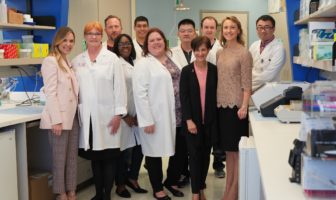The hormonal condition PCOS is widespread but still misunderstood.
By Trinady Joslin
Doctors first discovered polycystic ovarian syndrome (PCOS) in the 1930s when they started noticing pearl-like cysts on the periphery of some women’s ovaries. As science has progressed, the analogy of a pearl necklace stuck but doctors have since learned the hormonal condition is much more nuanced.
“In actuality, they’re not cysts at all,” Texas Fertility Center’s Dr. Lisa Hansard says. “They’re the follicles that the eggs develop in.”
For a woman to get pregnant, two hormones must interact to produce a dominant follicle. The follicle stimulating hormone (FSH) causes the ovary to produce follicles, while the luteinizing hormone (LH) causes the dominant follicle to ovulate. Women who have PCOS have higher levels of LH relative to FSH and this impairs ovulation.
“Women with PCOS rarely grow a dominant follicle; they remain at the same immature stage of development,” Hansard says. “So, you’ve got all these little follicles basically in limbo.”
According to the Centers for Disease Control and Prevention, PCOS affects up to five million women in the U.S. and is one of the top causes of infertility. Austin resident Stephanie Tollett was diagnosed at age 19 and for the past two decades has learned alongside the medical field how to manage her treatment.
“It affects every way my body functions,” Tollett says.
It strips a lot of our ability to feel like a woman.
STEPHANIE TOLLETT
Higher cortisol levels create dark patches of skin on her body, varying glucose levels affect her ability to lose weight and keep it off and her inability to shed uterine lining creates a higher risk for ovarian, uterine and cervical cancers. She experiences hair loss and spots of unwanted hair growth. PCOS also affects her mental health, increasing her likelihood for anxiety and depression.
“Some of the physical attributes I have of PCOS makes it very hard to have a good self-esteem,” Tollett says. “We have a lot of physical identifiers that are not socially feminine. It strips a lot of our ability to feel like a woman. And it’s really hard to live with.”
Tollett has been married for 13 years and says while she and her husband have been trying to get pregnant, PCOS makes it difficult because she does not ovulate.
“The one thing I wanted when I got married more than anything was to be a mother and 13 years later, I’m not one yet,” Tollett says.
Hansard says taking birth control and decreasing sugar intake can help manage the symptoms of PCOS, but the condition isn’t curable, and doctors aren’t sure what causes it, though they suspect genetics may be a factor.
Three years ago, Tollett created a group on Facebook called PCOS Support Group – Austin Area to connect women with PCOS and provide resources for managing the condition.
“It has now become a mission for me to help other women realize that this is a problem,” Tollett says. “If you have not been tested and you think you may have it, [I] strongly advise you to do it as soon as possible, because the younger you are when you realize you have it, the better you are able to reverse some of the symptoms.”
The group, which now has around 160 members from the Austin area, also helps women learn to advocate for themselves and provides a support system within a safe space.
“This group has really created a place where women can come… There is nothing wrong with you,” Tollett says. “This is just something that we are all in together.”




